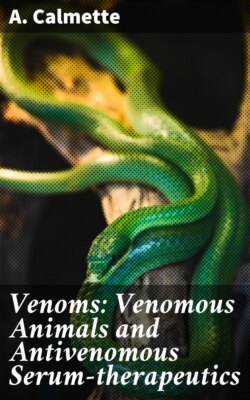Читать книгу Venoms: Venomous Animals and Antivenomous Serum-therapeutics - A. Calmette - Страница 59
На сайте Литреса книга снята с продажи.
(h) Hoplocephalus.
ОглавлениеCharacters the same as in Micropechis. Scales in 21 rows; ventrals angulate and notched laterally. Tail moderate; subcaudals in a single row.
(1) H. bungaroides (Syn. H. variegatus. The Broad-headed Snake).—204–221 ventrals; 40–56 subcaudals.
Colour black on the back, with yellow spots forming more or less regular cross-bands on the body; upper lip yellow, margined with black; belly blackish, yellow on the sides.
Total length, 1,620 millimetres; tail 210.
Habitat: New South Wales.
(2) H. bitorquatus (fig. 58).—Ventral scales strongly angulate laterally, 191–227; subcaudals 44–59.
Fig. 58.—Hoplocephalus bitorquatus.
Colour olive-green; head pale olive, with a bright yellow occipital blotch, and a large black blotch on each side of the nape; a pair of small spots in front of and between the eyes; three black transverse blotches on the vertex; belly greyish-olive or brown.
Total length, 510 millimetres; tail 95.
Habitat: Queensland, New South Wales.
(3) H. stephensii.—239 ventrals; 60 subcaudals.
Body barred alternately with black and white; the black bars are twice as broad as the white ones; head dark, spotted with yellow; a W-shaped yellow mark on the back of the head.
Total length, 760 millimetres.
Habitat: Port Macquarie, New South Wales.
